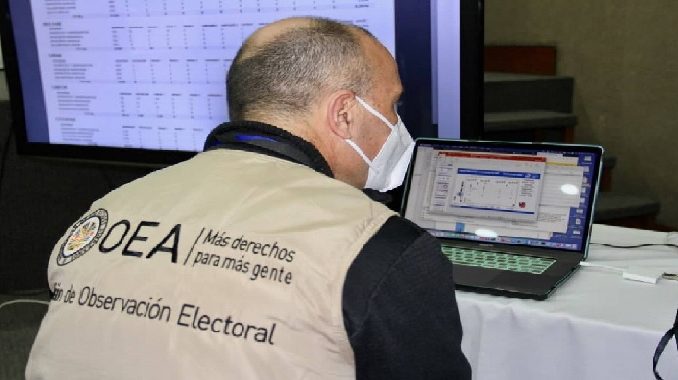
Around 2.134 national observers and 225 international observers are accredited, so far, by the National Electoral Council (CNE) to participate in the electoral process on February 7.
Some of the powers of the national and international observer in the elections are: to observe the installation of the Vote Receiving Boards (JRV) and the development of the votes, to dialogue with the candidates and the delegates of the political subjects in the electoral precincts, without affect the electoral process, also observe the scrutinies and challenges, as well as the operation of the counting centers.
According to last Monday’s report, of the 2.134 national observers accredited by the CNE, about 799 are: 789 natural persons, 2 foreigners residing in Ecuador and 8 Ecuadorians residing abroad (Germany, Spain, Italy, Switzerland and the United Kingdom) .
The other 1.335 national accredited observers are by invitation. They are: the National Council for the Equality of Disabilities, 802; Citizen Participation Corporation, 322; Citizen Observatory of Electoral Control, 129; National Council for Intergenerational Equality, 28; SEK International University, 9; Association of Employees and Workers of the Universidad Laica Eloy Alfaro (Asoet), 9; Ecuadorians residing abroad, 7; Doing Ecuador Foundation, 6; National Council for Human Mobility Equality, 5; Institute of High National Studies, 5; National Council for Gender Equality, 4; American Association of Jurists Ecuador branch, 4; Equinoccial Technical University, 3; State University of the South of Manabí, 2.
In the process of rectification are the Andean Coordination of Human Rights (Cadhu), the Association of Digital Users and individuals, 6. In the process of accreditation are 11 Ecuadorians living abroad and 228 civil society organizations.
According to the regulations there are two modes of international observation: independent and conducted.
The first is carried out by natural or legal persons or by organizations outside the State or the structure of the Electoral Function that they wish to execute autonomously.
The observation conducted is carried out by representatives of international electoral bodies, those in charge of electoral processes in the various countries, academic experts in electoral politics or special guests. They will be accompanied by the National Directorate of International Relations, Cooperation and Electoral Observation of the CNE.
The international observers who are invited by the CNE do not present any documentation, notwithstanding that they sign an accreditation form that denotes their adherence to the Constitution, laws and regulations.
According to the latest CNE reports, there are currently 225 accredited international observers: 18, independent mission; 114, mission conducted; and, 93 guests.
Among the international organizations accredited for independent observation are the European Union, 3; Organization of American States (OAS), 3; the Inter-American Union of Electoral Organizations (Uniore), 8; and the World Association of Electoral Bodies A-Web (for its acronym in English).
In the accreditation process are 18 delegates from the OAS and 8 delegates from Uniore.
In mission conducted 114 delegates are accredited, including 84 from the Honorable Diplomatic Corps.
According to the CNE report, at the moment there are 93 accredited delegates as invited international observers representing the following organizations: Coppal, 27; Progressive International, 18; Council of Electoral Experts of Latin America (Ceela), 8; Mercosur, 8; Lima Agreement, 7; European Left, 7; UPLA, 5; Idemoe, 5; ADPRA, 5; Foladh, 1; Federal United Left, 1; and, Observatory of the Global South, 1.

Be the first to comment